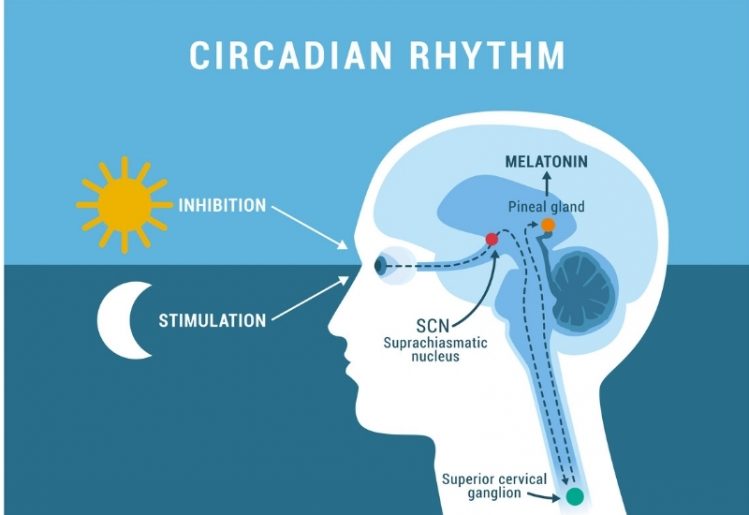Melatonin is a hormone produced by the body in response to low levels of light to initiate sleep. Due to its influence on the sleep-wake cycle, it is also a primary ingredient in many sleep aid formulas. How long does melatonin last in the body? This is an important consideration, as melatonin supplements can be formulated in a variety of ways, including immediate-release, delayed- or extended-release and pulsatile-release.
What is Melatonin?
 While melatonin is the primary ingredient in many sleep formulas, it is also a hormone that’s naturally produced in the brain’s pineal gland. Melatonin is released in the evening to help regulate the sleep cycle, and its release is governed by the circadian rhythm — the body’s internal clock.
While melatonin is the primary ingredient in many sleep formulas, it is also a hormone that’s naturally produced in the brain’s pineal gland. Melatonin is released in the evening to help regulate the sleep cycle, and its release is governed by the circadian rhythm — the body’s internal clock.
However, in the presence of an irregular sleep schedule or activities that disrupt the circadian rhythm, the release of melatonin may be disrupted. Something as simple as using a mobile device too close to bedtime can be enough to throw off your internal clock. In this case, the release of melatonin can be delayed or reduced, making it hard to fall asleep or sleep soundly through the night.
Although melatonin is best known for its role in promoting sleep, it also provides a myriad of other health benefits. For example, melatonin can be helpful for seasonal depression, which results from the reduced sunlight and shorter days of fall and winter. In this case, small doses of melatonin have helped individuals to fall asleep earlier so their circadian rhythms can adjust to the changes that the colder seasons bring about. As a result, seasonal depression can be soothed, and episodes of insomnia reduced.
Other research has found that melatonin is helpful in managing blood pressure, the immune system and stress hormone levels. For these conditions, taking smaller doses than those necessary to aid in sleep can be helpful. In general, taking 0.5–10 mg a day is beneficial in aiding sleep and providing other health benefits.
Because it’s a natural hormone, melatonin is safer than prescription drugs and causes no undesirable side effects when taken as directed. However, it should not be taken in combination with alcohol. If you’re already taking other medications, you should consult your doctor before adding a melatonin supplement to your daily routine.
How Long Does Melatonin Last in the Body?
For those looking to supplement with melatonin to help with occasional bouts of sleeplessness, it’s important to know how long does melatonin last in the body, as this will affect your choice of which type of melatonin supplement to take. Some melatonin supplements are immediate-release, meaning that they instantly release melatonin into the body. These types of melatonin formulas are designed to take effect within an hour of taking them, making it important to take the supplement close to bedtime.
Conversely, delayed- or extended-release melatonin supplements do not release melatonin immediately, but after a delay, release melatonin slowly over a period of time so the melatonin stays in the system longer. This type of melatonin supplement may be preferable for those who have a tendency to awaken in the middle of the night and have difficulty falling back to sleep. A down-side of delayed-release melatonin is that it may cause morning grogginess.
Revolutionary pulsatile-release melatonin supplements tap into the science of chronobiology, which studies the way the body uses hormones and other nutrients differently at various times of the day or night. Unlike either immediate-release or delayed/extended-release melatonin supplements, pulsatile-release melatonin supplements mimic the body’s natural nighttime melatonin release pattern. These supplements release an initial burst of melatonin to help initiate sleep, followed by additional pulses of melatonin over the next seven to eight hours. This special delivery system promotes a sound and restful sleep while allowing you to awaken feeling refreshed and energized with no morning grogginess.
How to Promote Healthy Melatonin Production Naturally
Your Diet Matters
There are two ways the foods you eat can help your brain produce and release more melatonin. First, certain fruits, such as bananas, tart cherries, pineapples and tomatoes, directly affect the production of the sleep hormone. Secondly, some foods contain an amino acid called tryptophan, which promotes the production of melatonin. Foods that provide the greatest supply of tryptophan include turkey, chicken, beans, nuts, lentils, seeds and seafood.
Take an Early Walk
It’s necessary to help your circadian rhythm to reset itself, particularly if you spend most of your day indoors. This involves going for a walk or run first thing in the morning when the sun is rising. Exposure to the sunlight soon after awakening will help to adjust your internal clock to the appropriate time of day.
Turn Off Electronic Devices Early
Just as exposing your eyes to sunlight early in the morning will help your brain adjust to the day, you should also help your brain adjust to the evening hours. The blue light that a mobile device gives off can disrupt this process, which can negatively impact the production of melatonin at night. Doctors recommend shutting off electronic devices at least one hour before bed.
Create a Bedtime Ritual
 Instead of using your electronic device, create a relaxation ritual that you can do every night. This will help you train your brain to recognize the signs that it’s time for rest, while also helping you wind down. This can involve taking a warm bath, reading a good book or meditating to soft music. Any practice that you find relaxing and enjoyable can be included in your bedtime ritual.
Instead of using your electronic device, create a relaxation ritual that you can do every night. This will help you train your brain to recognize the signs that it’s time for rest, while also helping you wind down. This can involve taking a warm bath, reading a good book or meditating to soft music. Any practice that you find relaxing and enjoyable can be included in your bedtime ritual.
Make Your Sleeping Quarters More Comfortable
If you can’t completely eliminate the ambient light that seeps into your bedroom, you should invest in a sleep mask that helps block out light. Similarly, background noises, such as traffic noise, can also inhibit your ability to sleep, so it may help to wear earplugs to bed. You can also improve the comfort in your bedroom by turning on the AC or a fan. It has been proven that people sleep more comfortably in cooler temperatures.
If you try these suggestions and still find it difficult to fall asleep or stay asleep, consult your doctor. In some cases, a sleep disorder can be the symptom of another health condition. Your doctor can help you identify the cause of your insomnia so you will sleep better more regularly.


